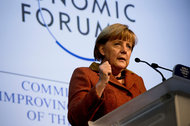PARIS — The economic outlook in major industrialized economies is improving, with the United States and Japan leading the way, the Organization for Economic Cooperation and Development said on Monday, adding that activity in the euro zone was also picking up.
The figures come after news last week that the U.S. jobless rate had fallen to a four-year low, offering a bright signal on the health of the world’s biggest economy.
The Paris-based O.E.C.D. said its latest monthly leading indicator for its 33 member countries was at its highest level since June 2011.
The composite leading indicator rose to 100.4 from 100.3 in December, which the organization said pointed to “firming growth.”
It also brought the measure, which is designed to flag turning points in economic activity, further above the long-term average of 100.
The O.E.C.D. says that the turning points in its indicators tend to precede changes in economic activity by about six months.
The United States showed the strongest improvement, with a reading of 100.9, unchanged from December. The index for Japan rose to 100.6 from 100.4.
The recession-hit euro zone also showed better signs, with its reading at its highest level since April, edging up to 99.7 from 99.6. The index for Germany, the largest euro zone economy and the engine for growth, rebounded to 99.6 from 99.2.
The O.E.C.D. said the readings for Italy and France signaled “no further declines in growth,” with the Italian index rising to 99.3 from 99.2 while France inched up to 99.5 from 99.4.
Among the major emerging economies tracked by the organization, the reading for China pointed to “moderating growth” at 99.0 after 99.1 in December. India saw “growth slowing down,” with a reading of 97.2 after 97.3, the O.E.C.D. said.
Article source: http://www.nytimes.com/2013/03/12/business/global/oecd-sees-improvement-in-developed-countries.html?partner=rss&emc=rss

